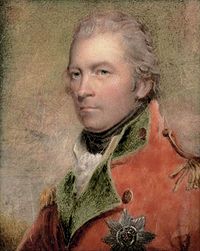Charles Lennox, 4th Duke of Richmond
|
His Grace The Duke of Richmond KG, PC |
|
|---|---|
 |
|
| Lord Lieutenant of Ireland | |
|
In office 11 April 1807 – 23 June 1813 |
|
| Monarch | George III |
| Prime Minister |
The Duke of Portland Hon. Spencer Perceval The Earl of Liverpool |
| Preceded by | The Duke of Bedford |
| Succeeded by | The Viscount Whitworth |
| Governor General of British North America | |
|
In office 1818–1819 |
|
| Monarch | George III |
| Preceded by | Sir John Coape Sherbrooke |
| Succeeded by | The Earl of Dalhousie |
| Personal details | |
| Born |
9 December 1764 Gordon Castle, Scotland |
| Died | 28 August 1819 (aged 54) Richmond, British North America |
| Nationality | Scottish |
| Political party | Tory |
| Spouse(s) | Lady Charlotte Gordon |
Charles Lennox, 4th Duke of Richmond, 4th Duke of Lennox, 4th Duke of Aubigny, KG, PC (9 December 1764 – 28 August 1819) was a Scottish soldier and politician and Governor General of British North America.
Richmond was born to General Lord George Lennox, the younger son of Charles Lennox, 2nd Duke of Richmond, and Lady Louisa, daughter of William Kerr, 4th Marquess of Lothian. His aunts included the famous five Lennox sisters.
Richmond was a keen cricketer. He was an accomplished right-hand bat and a noted wicket-keeper. An amateur, he was a founder member of the Marylebone Cricket Club. In 1786, together with the Earl of Winchilsea, Richmond offered Thomas Lord a guarantee against any losses Lord might suffer on starting a new cricket ground. This led to Lord opening his first cricket ground in 1787. Although Lord's Cricket Ground has since moved twice, Richmond and Winchilsea's guarantee provided the genesis of the best-known cricket ground in the world, a ground known as the Home of Cricket. Nearly always listed as the Hon. Colonel Charles Lennox in contemporary scorecards, Richmond had 55 recorded first-class appearances from 1784 to 1800 and played a few more games after that.
Richmond became a British Army captain at the age of 23 in 1787. On 27 May 1789, while a colonel in the Duke of York's regiment, he was involved in a duel with Frederick, Duke of York, who had expressed the opinion that "Colonel Lennox had heard words spoken to him at Daughbigny's, to which no gentleman ought to have submitted", effectively an accusation of failing to respond to an insult in the way that a gentleman should. At Wimbledon Common, Richmond fired, but his ball "grazed his Royal Highness's curl"; the Duke did not fire. Richmond shortly after exchanged his company for the commission of a lieutenant-colonel in the 35th Regiment of Foot. On 1 July of the same year, he was involved in another duel, with Theophilus Swift, Esq., in consequence of a pamphlet criticising Richmond's character published under Swift's name. They met in a field near the Uxbridge Road, where Swift was wounded in the body, but recovered.
...
Wikipedia
